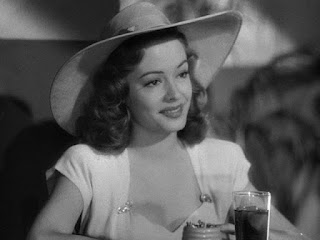 |
| Jane Greer |
"You're like a leaf that's been blown from one gutter to another."
Jeff (Robert Mitchum) has a new life running a gas station, as well as a girlfriend named Ann (Virginia Huston), when his past catches up with him in the person of gunsel, Joe (Paul Valentine). Joe works for crooked big shot Whit (Kirk Douglas), and some time ago he hired Jeff to go after his gorgeous gal pal, Kathie (Jane Greer), who not only shot Whit but left town with $40,000 in cash. In flashback we learn how Jeff caught up with Kathie and decided he wanted her for himself. But Kathie may have had other plans. Now she's back with Whit, who wants Jeff to do a favor for him -- or else. Well, Out of the Past should be prime film noir -- it certainly has all of the elements (even if much of it is actually played in sunlight instead of shadows), including a beautiful femme fatale, but somehow this just doesn't add up. The characters are little more than stick figures, brought to life with satisfactory but somehow second-rate thesping. Everyone, especially Douglas, who underplays nicely, is cool and professional but there's something missing, although Paul Valentine [House of Strangers] probably has the best role of his career in this and runs with it. Virginia Huston [Tarzan's Peril] is pleasant and competent but she only had a few credits after this. Dickie Moore [Passion Flower] makes an impression as the deaf and mute boy who works for Jeff at the gas station, as do Ken Niles as the nervous lawyer, Eels, and Rhonda Fleming as his secretary. Others in the cast are Steve Brodie as Jeff's former partner, and Richard Webb as a man who's carrying a long-time torch for Ann. The film is beautifully photographed in crisp black and white by Nicholas Musuraca [Clash By Night], and Roy Webb has contributed an effective theme. There's a certain poignancy to the conclusion, hinging on a not-so-little white lie. (Whether the lie should have been told or not Ill leave up to the individual viewer.) There's so much confusing going back and forth from place to place by the cast that it gets somewhat tiresome after awhile.
Verdict: For a great film noir with Robert Mitchum watch Otto Preminger's Angel Face instead of this. **1/2.





